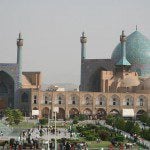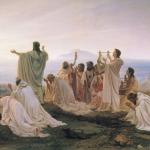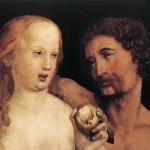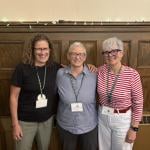
Every Primary child in the Church is familiar with the story of Ammon as he heroically defends the flocks of the Lamanite king against marauding brigands.
That’s plainly the most famous aspect of today’s reading, Alma 17.
Alma 17:18 tells us, regarding the sons of Mosiah, that Ammon was “the chief among them,” and that “he did administer unto them” and then “departed from them, after having blessed them according to their several stations, having imparted the word of God unto them, or administered unto them before his departure.”
Plainly, he had special status among the four royal sons. What was it? The clue, I think, is at Mosiah 27:34, where the four sons of Mosiah the king are listed in this order: Ammon, Aaron, Omner, and Himni. I suspect that this is their order of birth, which would make Ammon the senior son of Mosiah, the oldest of the brothers.
I suspect, too, that’s why we’re told his story first and most prominently among the four.
That kind of consistency in very small details, by the way, is one of many aspects of the Book of Mormon that impress me. Individually, they scarcely constitute decisive arguments for the authenticity and inspiration of the text, but, taken collectively, they do seem rather remarkable.
Incidentally, too, I would expect that one of the reasons — apart from divine help, of course! — for Ammon’s success against a group of rustlers is that, as the son of a king, he had been trained for fighting in a way that they likely had not. Anciently, after all, one of the chief functions of a king was to lead a nation’s armies and to fight, and, quite naturally, a royal son would be brought up to bear arms and would be given the very best coaching for that role. It was, in a sense, the family business.
The thieves probably didn’t know what hit them.
It reminds me of an amusing experience that I had while leading an intensive Arabic group in Jerusalem:
A very famous non-LDS scholar of the Dead Sea Scrolls and early Christianity lectures occasionally at BYU. During our stay there in Israel, he came and taught a two-week special seminar for the students. One day, he asked if anybody would be up for a little basketball on the Center’s half court. Several of the guys said, “Sure!” They probably thought that it would be amusing to play against this old guy. But I knew something that they didn’t know: He had played serious college basketball in his younger years. So I drew up a chair and watched. They, too, never knew what hit them. The old moves were still there.
A part of the chapter, though, that has meant a great deal to me for many years now, is a simple little item in the second verse. Alma and the sons of Mosiah have been separated, more or less, for fourteen years. So, when Alma sees them again after that long interval, he’s naturally delighted: “Alma did rejoice exceedingly to see his brethren; and what added more to his joy, they were still his brethren in the Lord.”
As the years go by, I’ve come to treasure many faithful friends. But I’ve also seen a few once faithful people fall by the wayside, including some of the children of friends. A small number of them have gone into intellectual apostasy, and a minority of them have actually had their names removed from the Church’s records. Others have simple drifted way. Once solid marriages have dissolved. Once sociable people have isolated themselves. It’s saddening.
So I understand Alma’s delight in meeting old friends after lengthy separation and discovering that they’re still committed to their faith.

I had that very experience myself, actually, a number of years ago:
During one roughly six-month period, just a few years after I had graduated from BYU and while my wife and I were living in Egypt, I received reports that, separately, three or four fairly good undergraduate acquaintances had left the Church. One had become a polygamist, of all things; the other two or three had simply drifted away, shedding their testimonies (and their covenants) with no apparent stress or trauma. I felt more than a little battered by the news, and I began to wonder whether I might simply be too stupid to have received or understood the memo that it was time for apostasy.
That summer, my wife and I headed to the United States for a visit. En route, we dropped through Switzerland, my beloved mission area, where, among other things, we attended a session at the temple in Zollikofen, near Bern. Waiting in the chapel before the session started, I was surprised and very happy to find ourselves seated beside an old BYU friend and his wife. We hadn’t been in contact for quite a while by then, and, since I had seen him last, he had finished a doctorate at Harvard and was working in Germany. I thought immediately of Alma’s happiness at seeing the sons of Mosiah after a long absence: I did rejoice exceedingly to see my brother. And what added more to my joy, he was still my brother in the Lord. (He’s now a General Authority.)












